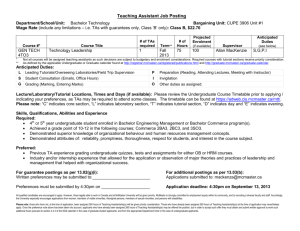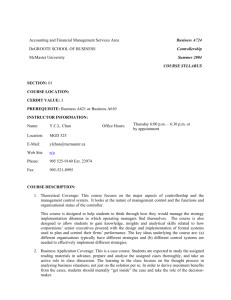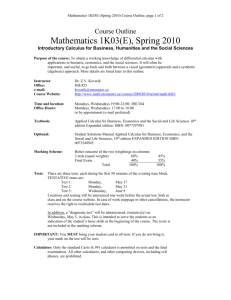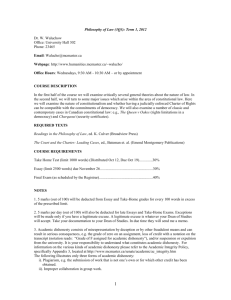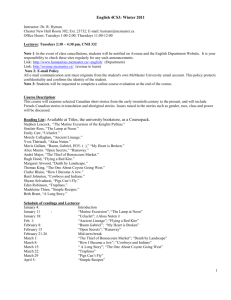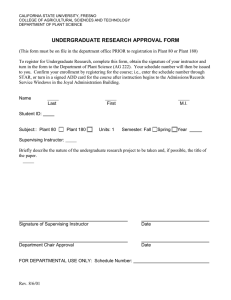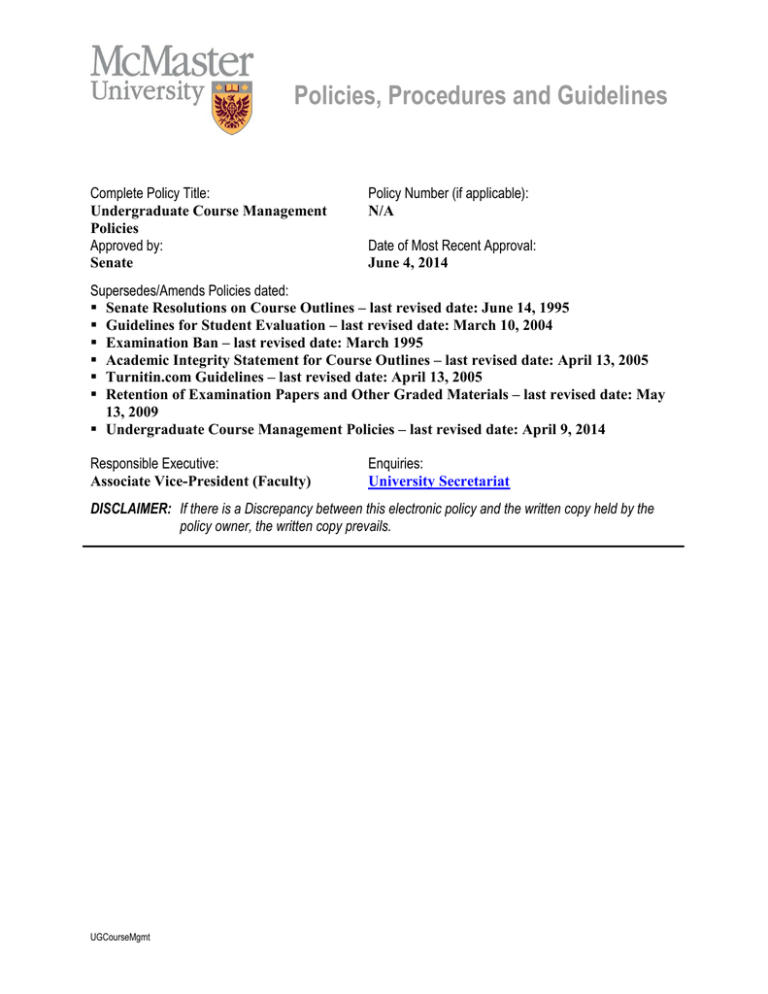
Policies, Procedures and Guidelines
Complete Policy Title:
Undergraduate Course Management
Policies
Approved by:
Senate
Policy Number (if applicable):
N/A
Date of Most Recent Approval:
June 4, 2014
Supersedes/Amends Policies dated:
Senate Resolutions on Course Outlines – last revised date: June 14, 1995
Guidelines for Student Evaluation – last revised date: March 10, 2004
Examination Ban – last revised date: March 1995
Academic Integrity Statement for Course Outlines – last revised date: April 13, 2005
Turnitin.com Guidelines – last revised date: April 13, 2005
Retention of Examination Papers and Other Graded Materials – last revised date: May
13, 2009
Undergraduate Course Management Policies – last revised date: April 9, 2014
Responsible Executive:
Associate Vice-President (Faculty)
Enquiries:
University Secretariat
DISCLAIMER: If there is a Discrepancy between this electronic policy and the written copy held by the
policy owner, the written copy prevails.
UGCourseMgmt
Undergraduate Course Management Policies
June 4, 2014
Page 1
UNDERGRADUATE COURSE MANAGEMENT POLICIES
PREAMBLE
This document brings together policies approved by the Senate of McMaster University related to the
management of undergraduate courses. These policies are intended to communicate clearly the University’s
expectations with regard to the responsibilities of both students and instructors and to assist students in
planning ahead and managing their time and resources accordingly. Each section addresses a separate
issue and the appendices provide additional useful information.
Appendix I
Appendix II
Appendix III
Approved language for information to be included in course outlines
McMaster University Grading Scale
Examples of course outlines
SECTION A: COURSE OUTLINES
A course outline sets the expectations for students and what they can expect in terms of instruction they will
receive, the format in which the course will be delivered and the knowledge and skills that can be gained.
The outline introduces the course and the instructor and sets out the expectations of the instructor so that
students are aware of how they will learn, what level of participation will be expected and how they will be
assessed.
1. Since Calendar descriptions of courses are necessarily brief, instructors are required to provide students
with a more detailed course outline describing the administrative and academic details of the course.
Such outlines are to be made available to students at the beginning of the course and must be kept on
file for 10 years in the department administering the course.
2. Students will expect the course to unfold as described in the course outline and will plan their time and
resources accordingly. As questions or concerns during the course will be referred back to the course
outline, instructors are encouraged to anticipate issues that might arise and specify how those issues
will be addressed (e.g., late submission of assignments, missed tests).
3. The arrangement proposed in the course outline should not be interpreted in a way that discourages
flexibility in course presentation and organization. If an instructor wishes to reserve decisions to be
made as the course progresses, that intention should be stated in the course outline (for example, see
the final paragraph on page 11 which begins, “At certain points in the course…”).
4. If it becomes necessary to make changes to some part of the course during the term, reasonable notice
and communication between the instructor and students is critical. Students should be provided with an
explanation and an opportunity to comment. The instructor is encouraged to use multiple communication
methods with students (e.g. class announcements, message sent to an e-mail list, message posted on
the course web-site, etc.). Any significant changes should be made in consultation with the Department
Chair.
Undergraduate Course Management Policies
June 4, 2014
Page 2
5. The University reserves the right to change dates and/or deadlines etc. for any or all courses in the
case of an emergency situation or labour disruption or civil unrest/disobedience, etc.
6. A course outline should include the following:
Administrative Details
• Contact information
• Office hours or how/when available
• Session and term of the class
Course Objectives
• List of course objectives (by the end of the
course, what should the students know, be
able to do, value, demonstrate etc.)
Materials & Fees
• List of all required materials e.g. textbooks,
materials (calculators, art supplies, etc).
• Any additional expenses which may be
required (e.g., trips)
Course Overview and Assessment
• A clear breakdown of the course
requirements or expectations including the
weight given to each and due date (if
possible)
• How work is to be submitted
• Policy on missed work, extensions, and late
penalties
Additional statements
• Academic Integrity statement – see
Appendix I
• Academic Accommodation of Students with
Disabilities statement – see Appendix I
• Notice regarding possible course
modification
• Any other policy relevant to the course
For sample course outlines please see Appendix III.
If applicable include:
• TA and/or Course Coordinator contact
information
• Website address or alternative methods of
communication
If applicable include:
• Final exam (specify if a final is included, and
whether it tests cumulative knowledge)
• Weekly breakdown of class topics and readings
• Attendance requirements
• Class participation expectations
• Group work expectations and how group work
will be evaluated
• Grade adjustment techniques
• Where possible, include the criteria to be used
in evaluating a student’s work
If applicable include:
• Turnitin.com statement –see Appendix I
• On-line statement for courses requiring
online access or work – see Appendix I
• Reference to Research Ethics
Undergraduate Course Management Policies
June 4, 2014
Page 3
SECTION B: EARLY FEEDBACK
When students are aware of their progress early in a course they can make informed decisions.
1. All students should receive feedback regarding their progress prior to the final date by which a student
may cancel the course without academic penalty.
2. For the majority of undergraduate courses this feedback must equal a minimum of 10% of the final grade.
3. For supervised study, thesis, capstone, inquiry, and independent research/study courses, clear and early
feedback must also be provided.
SECTION C: ASSESSMENT BAN
1. Purpose:
The Assessment Ban is intended to enable students to continue to attend classes and start preparing
for examinations held during the official University examination period. The Assessment Ban does not
apply to the M.D., B.H.Sc. (Midwifery), B.H.Sc. (Physician Assistant), or to Levels 2 and above of the
Medical Radiation Sciences programs
a) There is a university-wide ban on examinations and tests in the final week of classes: see below for
exemptions. Each year the dates will be listed in the SESSIONAL DATES section of the Undergraduate
Calendar. The ban covers the last five days of classes plus the day or days between the end of
classes and the beginning of exams.
2. Application:
a) Assignments worth more than 10% of the final course grade that are assigned at the beginning of
term and noted on the course outline can be due during the Assessment Ban period.
b) Assignments worth more than 10% of the final course grade cannot be assigned during the
Assessment Ban period.
c) Tests and exams cannot be scheduled during the Assessment Ban period.
d) Take home exams worth more than 10% of the final course grade cannot be assigned or due
during the Assessment Ban period.
3. Exemptions:
a) Tests, including lab tests, are exempt when:
• the test is held in the normal class or lab time slot AND
• the test is worth no more than 10% of the final course grade.
b) Requests for a waiver of the ban must be approved by the Faculty or Program Office before being
considered by Undergraduate Council.
Undergraduate Course Management Policies
June 4, 2014
Page 4
SECTION D: TURNITIN.COM
1. McMaster University approves the use of Turnitin.com for the following reasons:
a) prevention – if students know their academic work is being checked for plagiarism, they will hopefully
use proper citation methods
b) protection of honest students and their work
c) detection – with the type of technology in common use today, it is necessary to use a detection tool
which checks academic work against the Internet
2. Guidelines for the use of Turnitin.com:
a) papers should be submitted to Turnitin.com only with the student’s knowledge;
b) the instructor should indicate that Turnitin.com will be used in the course outline and/or on the
assignment details;
c) the use of Turnitin.com cannot be mandatory*. If a student refuses to submit his or her work to
Turnitin.com, he or she cannot be compelled to do so and should not be penalized. Instructors are
advised to accept a hard copy of the assignment and grade it as per normal methods. The assignment
can be subjected to a Google search or some other kind of search engine if the instructor wishes.
*
Some students object to the use of Turnitin.com because of ownership issues. All work submitted
to Turnitin.com becomes part of their database and is used to check authenticity of other student’s
assignments. Some students object to their work being put in the database and others object
to their work being used by Turnitin.com.
SECTION E: RETENTION OF EXAMINATION PAPERS AND OTHER GRADED MATERIAL
Department Chairs (or Director of a School or Program) are responsible for ensuring that final examinations
and all other graded material not meant to be returned to students, and the instructor's record of how the final
grades in a course were determined, are retained for at least one year after last use, and remain accessible
to the Department Chair for that period.
This policy applies to all instructors. Sessional lecturers and those retiring or otherwise leaving the service
of the University must notify their immediate supervisor of the on-campus storage location of the material.
SECTION F: CONFLICT OF INTEREST GUIDELINES
Faculty members and University officers normally shall not take part in any proceedings at any level which
affect the academic standing of an immediate family member (spouse, common-law partner, parent, in-law,
sibling, child or step-child). Such proceedings include admission, scholarships, financial assistance and
reviewing. There shall be no restriction against a student registering in a course taught by an immediate
family member. In all such cases, however, the instructor must inform his/her Department Chair who shall
ensure that arrangements are made for an appropriate assessment of the student’s performance involving
a qualified person or persons other than the instructor.
Undergraduate Course Management Policies
June 4, 2014
Page 5
RELATED POLICIES:
1. The Freedom of Information and Protection of Privacy Act (FIPPA) applies to universities. Instructors
should take care to protect student names, student numbers, grades and all other personal information
at all times. For example, the submission and return of assignments and the posting of grades must be
done in a manner that ensures confidentiality - see http://www.mcmaster.ca/univsec/fippa/fippa.cfm
2. Academic Integrity Policy
3. Academic Accommodation of Students with Disabilities Policy
4. Student Code of Conduct
5. Research Ethics Policy
6. Risk Management Policy for field trips – see Field-Trip-and-Electives-Planning-and-Approval-Program
7. Conflict of Interest-Undergraduate and Graduate Studies
8. Rights and Responsibilities of Undergraduate Students During Work Stoppages that Substantially
Disrupt Academic Activities
Undergraduate Course Management Policies
June 4, 2014
Page 6
APPENDIX I: APPROVED LANGUAGE FOR COURSE OUTLINES
1. ACADEMIC INTEGRITY LANGUAGE FOR COURSE OUTLINES
You are expected to exhibit honesty and use ethical behaviour in all aspects of the learning process. Academic
credentials you earn are rooted in principles of honesty and academic integrity.
Academic dishonesty is to knowingly act or fail to act in a way that results or could result in unearned academic
credit or advantage. This behaviour can result in serious consequences, e.g. the grade of zero on an
assignment, loss of credit with a notation on the transcript (notation reads: “Grade of F assigned for academic
dishonesty”), and/or suspension or expulsion from the university.
It is your responsibility to understand what constitutes academic dishonesty. For information on the various
types of academic dishonesty please refer to the Academic Integrity Policy, located at
www.mcmaster.ca/academicintegrity.
The following illustrates only three forms of academic dishonesty:
1. Plagiarism, e.g. the submission of work that is not one’s own or for which other credit has been obtained.
2. Improper collaboration in group work.
3. Copying or using unauthorized aids in tests and examinations.
2. TURNITIN.COM LANGUAGE FOR COURSE OUTLINES
In this course we will be using a web-based service (Turnitin.com) to reveal plagiarism. Students will be
expected to submit their work electronically to Turnitin.com and in hard copy so that it can be checked for
academic dishonesty. Students who do not wish to submit their work to Turnitin.com must still submit a
copy to the instructor. No penalty will be assigned to a student who does not submit work to Turnitin.com.
All submitted work is subject to normal verification that standards of academic integrity have been upheld
(e.g., on-line search, etc.). To see the Turnitin.com Policy, please go to
www.mcmaster.ca/academicintegrity.
3. LANGUAGE FOR USE IN COURSES WITH AN ON-LINE ELEMENT
In this course we will be using X. Students should be aware that, when they access the electronic components
of this course, private information such as first and last names, user names for the McMaster e-mail accounts,
and program affiliation may become apparent to all other students in the same course. The available information
is dependent on the technology used. Continuation in this course will be deemed consent to this disclosure.
If you have any questions or concerns about such disclosure please discuss this with the course instructor.
X = e-mail, LearnLink, WebCT, web pages, capa, Moodle, ThinkingCap, etc.
Undergraduate Course Management Policies
June 4, 2014
Page 7
4. ACADEMIC ACCOMMODATION OF STUDENTS WITH DISABILITIES LANGUAGE FOR COURSE
OUTLINES
Students who require academic accommodation must contact Student Accessibility Services (SAS) to
make arrangements with a Program Coordinator. Academic accommodations must be arranged for each
term of study. Student Accessibility Services can be contacted by phone 905-525-9140 ext. 28652 or e-mail
sas@mcmaster.ca. For further information, consult McMaster University’s Policy for Academic
Accommodation of Students with Disabilities.
Page 8
Undergraduate Course Management Policies
June 4, 2014
APPENDIX II: MCMASTER UNIVERSITY GRADING SCALE
Grade
A+
A
AB+
B
BC+
C
CD+
D
DF
Equivalent Grade Point
12
11
10
9
8
7
6
5
4
3
2
1
0
Equivalent Percentages
90-100
85-89
80-84
77-79
73-76
70-72
67-69
63-66
60-62
57-59
53-56
50-52
0-49
Page 9
Undergraduate Course Management Policies
June 4, 2014
APPENDIX III: SAMPLE #1
HISTORY 1B03
The Americas and the World: From the Colonial Period to the Twentieth Century
FALL 2006
Professor Anita Holiday
007 Chester New Hall, x. 12345
bondjames@mcmaster.ca
Office Hours: Wednesday, 1:00-2:00 or by appointment.
Lectures: Monday, Thursday, 12:30-1:20, TSH/B128
Important Note:
This course uses WebCt to post the course outline, assignments, and other notices. Go to
http://webCT.mcmaster.ca to find out how to log-on to the course’s home page.
Course Description:
This course examines the creation and nature of the Atlantic world, from the Columbian encounter in the
fifteenth century to the middle of the nineteenth century and the emergence of new political and social
organizations. In bringing together the histories of Europe, Africa, and the Americas, the course prepares
students to undertake more specialized studies in the history of the Atlantic world. Readings include articles
written by leading scholars in the field of Atlantic history as well as primary sources. The course will be
organized in weekly lectures and discussions.
Course Objectives:
By the end of this course students should be able to,
• define, describe and analyse key events and themes in the history of the Americas
• demonstrate critical reading skills, particularly in the area of evaluating historical arguments and
interpretations
• apply historical research skills introduced in class
• demonstrate verbal communication skills through regular discussions
Required Texts:
These are available at Titles, the university bookstore.
1. Timothy J. Shannon, Atlantic Lives: A Comparative Approach to Early America New York: Pearson
Longman, 2004.
2. Carol Berkin and Betty S. Anderson, The History Handbook. Boston: Houghton Mifflin, 2003.
3. Philip D. Curtin. The Rise and Fall of the Plantation Complex: Essays in Atlantic History. 2nd
edition. New York: Cambridge University Press, 1999; 1990.
4. Sidney W. Mintz. Sweetness and Power: The Place of Sugar in Modern History. New York:
Penguin Books, 1986.
5. Courseware package.
Undergraduate Course Management Policies
June 4, 2014
Page 10
Course Evaluation:
Tutorial Participation
15%
Students are expected to attend every tutorial and to be prepared to discuss the assigned weekly
readings. Students must participate regularly to receive a good grade in this section of the course;
attendance alone will not be enough. Students who have a legitimate and documented reason for
missing a tutorial must submit a brief paper based on the readings for that week to receive participation
credit for the missed class. (These papers should be approximately 750 words in length, or around
3 pages.) The tutorial leader will set the assignment. This assignment is in addition to the discussion
paper that may also be due in the tutorial.
Note about changing tutorials:
If you need to change tutorials, contact Joe Smith or Jane Doe in the History Department office,
CNH, 6th floor (next to the elevators).
Library Assignment
5%
A library class will be held on September 28th, during the lecture period, in TSH/B128. Attendance
is mandatory. A library assignment will be distributed during this session and must be completed
and submitted during tutorial the following week.
Discussion Papers
20% (2 x 10%)
Students are to submit two (2) brief discussion papers. The papers should be 3-4 pages in length
(or approximately 850 to 1,000 words). In each paper, students will respond to a question based on
the course readings. These papers are designed to help students with the weekly readings and to
help them participate in the tutorial discussions. The papers are due at the beginning of the tutorial.
Late papers will not be accepted, unless students have a legitimate and documented reason.
Discussion paper 1 is due in lecture, October 12th.
Discussion paper 2 is due in tutorial, in the week of October 30th.
Discussion paper 1: Answer question 4, p. 124, in Shannon. In answering this question, you must
develop and prove an argument. The paper must be properly referenced, with footnotes and a
bibliography (these are not included in the required page length). More detail to follow in class.
Discussion paper 2: Compare the arguments and main themes in the articles by Beckles and
Galenson. In this paper, you must develop and prove an argument. The paper must be properly
referenced, with footnotes and a bibliography (these are not included in the required page length).
More detail to follow in class.
Essay
30%
Students will submit a paper based on Sidney Mintz’s Sweetness and Power (the assignment will
be distributed later in the term). The papers should be 7-8 pages in length (or approximately 1,750
to 2,000 words).
This assignment is due November 23rd.
Final Examination
30%
The final examination will be held during the examination period at the end of semester.
Undergraduate Course Management Policies
June 4, 2014
Page 11
Written Work and Late Submissions:
All written work will be marked on grammar, clarity of writing, and organization, as well as content and
analysis. More details about the marking scheme are posted on the course website. All essays must be
properly referenced, with footnotes and a bibliography. Use the Turabian (Chicago) style for referencing;
examples can be found at McMaster University Library-Guides or in Berkin and Anderson, chapter 11.
Students are encouraged to visit the Centre for Student Development to improve their essay skills (MUSC
B107; x24711). For information about the Writing Clinic and the Centre’s other services, visit the Centre’s
website: http://csd.mcmaster.ca. Chapter 12 in Berkin and Anderson is also useful.
All written work must be submitted in tutorial, on the due date. Do not submit essays by email and do not
slide them under the instructor’s door. Late assignments will be penalized 5% a day (weekends will count
as one day). Late penalties will not be waived unless your Faculty/Program Office advises the instructor
that you have submitted to that office the appropriate documentation to support your inability to submit the
work by the due date.
Academic Integrity:
You are expected to exhibit honesty and use ethical behaviour in all aspects of the learning process.
Academic credentials you earn are rooted in principles of honesty and academic integrity.
Academic dishonesty is to knowingly act or fail to act in a way that results or could result in unearned
academic credit or advantage. This behaviour can result in serious consequences, e.g. the grade of zero
on an assignment, loss of credit with a notation on the transcript (notation reads: “Grade of F assigned for
academic dishonesty”), and/or suspension or expulsion from the university.
It is your responsibility to understand what constitutes academic dishonesty. For information on the various
types of academic dishonesty please refer to the Academic Integrity Policy, located at
http://www.mcmaster.ca/academicintegrity
The following illustrates only three forms of academic dishonesty:
1. Plagiarism, e.g. the submission of work that is not one’s own or for which other credit has been obtained.
2. Improper collaboration in group work.
3. Copying or using unauthorized aids in tests and examinations.
Academic Accommodation of Students with Disabilities:
Students who require academic accommodation must contact Student Accessibility Services (SAS) to
make arrangements with a Program Coordinator. Academic accommodations must be arranged for each
term of study. Student Accessibility Services can be contacted by phone 905-525-9140, ext. 2865 or e-mail
sas@mcmaster.ca. For further information, consult McMaster University’s Policy for Academic
Accommodation of Students with Disabilities.
At certain points in the course it may make good sense to modify the schedule outlined below. The instructor
reserves the right to modify elements of the course and will notify students accordingly (in class and post
any changes to the course website).
Undergraduate Course Management Policies
June 4, 2014
Page 12
SCHEDULE OF READINGS AND LECTURES
September 7
Introduction to course
No tutorials this week
September 11
September 14
Europe before 1492
First Contacts: Africans and Europeans
No tutorials this week
Reading:
“Introduction: What is Atlantic History?,” in Shannon, pp. 1-5
Carol Berkin and Betty S. Anderson, The History Handbook. Boston: Houghton
Mifflin, 2003, pp. 1-24
September 18
September 21
European Expansion
The Caribbean Experiment
No tutorials this week.
Reading:
Curtin, chapters 1, 2, 3
September 25
September 28
The Conquest of Mexico and South America
Library class. Attendance is mandatory.
Note: Tutorials start this week.
Reading:
David Watts, “Early Hispanic New World Agriculture, 1492-1509” (courseware)
Berkin and Anderson, pp. 36-45.
October 2
October 5
Exploitation and Settlement in Spanish America
Competition for the Americas
Tutorial Reading:
Curtin, chapters 4 and 5
Shannon, pp. 107-125.
*Discussion paper 1 due in tutorial [changed to Oct 12th]
October 9
October 12
Thanksgiving. No class.
Buccaneers and the Balance of Power in the Americas
Reading:
Curtin, chapter 7
Marcus Rediker, “‘Under the Banner of King Death’: The Social World of AngloAmerican Pirates, 1716-1726” (courseware)
*Note: no tutorials this week.
Undergraduate Course Management Policies
June 4, 2014
Page 13
October 16
October 19
The Reformation and English Exploration
The Dutch and the French in the Americas
Tutorial Reading:
Shannon, pp. 127-147.
**Tutorials should discuss the questions on pp. 145-6.
October 23
October 26
Atlantic Economies
Colonies of Exploitation and Settlement
Tutorial Readings:
Hilary Beckles, “A ‘Riotous and Unruly Lot’: Irish Indentured Servants and Freemen
in the English West Indies, 1644-1713” (courseware) David Galenson, “‘Economic
Aspects of the Growth of Slavery in the Seventeenth-century Chesapeake”
(courseware)
*Discussion paper 2 due in tutorial [changed to week of Oct 30th]
October 30
November 2
Settling the Colonies: European Migration
Africa and the Slave Trade
Tutorial Reading:
Curtin, chapter 3, 9.
Shannon, pp. 65-83.
**Tutorials should discuss the questions on p. 82.
November 6
November 9
Agriculture and Slavery
Cultural Exchanges
Tutorial Reading:
Curtin, chapters 6, 8, 10
Mintz, “Introduction,” and chapters 1-3.
November 13
November 16
Africa, Slavery and Europe
Resistance to Slavery
Tutorial Reading:
Mintz, chapters 4-5
November 20
November 23
The American Revolution and the Atlantic World
The Spread of Revolution: France and St. Domingue
Tutorial Reading:
Curtin, chapters 11, 12
Shannon, pp. 208-228.
**Tutorials should discuss questions on p. 227.
*Note: The essay is due on November 23rd
Undergraduate Course Management Policies
June 4, 2014
Page 14
November 27
November 30
The Spread of Revolution: Spanish America
The End of Slavery
Tutorial Reading:
Curtin, 13, 14
John Thornton, “‘I am the Subject of the King of Congo’: African Political Ideology
and the Haitian Revolution” (courseware) Stanley Engerman, “Emancipations in
Comparative Perspective: A Long and Wide View” (courseware)
**Tutorials should compare the arguments and main themes in the articles by
Thornton and Engerman. What factors led to the end of slavery?
December 4
Summary and Review
Page 15
Undergraduate Course Management Policies
June 4, 2014
APPENDIX III: SAMPLE #2
Physics 1B03
Sections 1–3
Course Outline for Term 1 2006-2007
Home page: http://www.physics.mcmaster.ca/phys1b03/
This course is an introduction to the physics of particles and waves. We begin by studying the classical mechanics of
point particles with a particular emphasis on work and energy. The course then continues with the physics of waves,
especially the wave properties of light, and an exploration of the physical properties of fluids. Applications in the life
sciences are included. The application of these ideas in modern physics is the main subject matter of Physics 1B03.
Instructors:
Sections 1, 2
Sections 3
I. Loveteaching
R. U. Sleeping
ABB
002
45678
ABB
003
56789
asdf@mcmaster.ca
Office Hours
Wednesdays 12:00 – 2:00
Jklh@mcmaster.ca
Office Hours
Thursdays 9:30 – 11:30
Required Texts:
Physics for Scientists and Engineers with Modern Physics, A Strategic Approach, Randall D. Knight,
Pearson/Addison Wesley, 2004.
Physics 1B03 Practical Exercises & Supplementary Material, September 2005.
Calculator:
Only the McMaster Standard Calculator will be permitted in tests and examinations. This is available at the McMaster
Bookstore.
Course Aims:
• To come to appreciate that equations don’t solve physics problems – ideas solve physics problems!
• To move beyond being able to recite the laws of mechanics to being able to use them.
• To understand that a wide range of problems can be tackled with a few basic concepts.
Course Objectives:
By the end of this course students will be able to:
• Define, describe and apply the laws of mechanics
• Demonstrate a conceptual approach to problem solving in physics
• Apply basic physics concepts to solve a wide range of problems
• Use common language to explain solutions to physics problems
Format:
• Each class meets three times per week. The format is similar to that of inquiry courses in which the topics
will be discussed amongst the members of the class.
• There will be assignments most weeks. We will be using the software tool called Computer-Assisted Personalized
Approach (CAPA). This tool generates individualized assignments for you to print. Later, you can enter your
answers which the program will grade. CAPA is accessed through WebCT.
Page 16
Undergraduate Course Management Policies
June 4, 2014
•
•
There will be two tests on the evenings of the weeks indicated below. You will be informed of the actual time
and location at a later date.
The material studied in class is supported by practical exercises. There are practical sessions every week
each lasting 2 hours. All the sessions are in BSB B114.
Marking Scheme:
Assignments
7.5%
Tests
30%
Class Activity & Quiz
5%
Practical Exercises
12.5%
Exam
45%
Missed Lab Work:
Lab work missed due to illness or personal circumstances may be made up. You must submit appropriate documentation
(e.g. note from physician) to your Faculty/Program office. It is your responsibility to follow-up with the lab supervisor.
No mark will be entered for the missed work unless the Faculty/Program office gives its approval.
Academic Dishonesty:
You are expected to exhibit honesty and use ethical behaviour in all aspects of the learning process. Academic
credentials you earn are rooted in principles of honesty and academic integrity.
Academic dishonesty is to knowingly act or fail to act in a way that results or could result in unearned academic credit or
advantage. This behaviour can result in serious consequences, e.g. the grade of zero on an assignment, loss of credit
with a notation on the transcript (notation reads: “Grade of F assigned for academic dishonesty”), and/or suspension
or expulsion from the university.
It is your responsibility to understand what constitutes academic dishonesty. For information on the various types of
academic dishonesty please refer to the Academic Integrity Policy, located at
http://www.mcmaster.ca/academicintegrity
The following illustrates only three forms of academic dishonesty:
1. Plagiarism, e.g. the submission of work that is not one’s own or for which other credit has been obtained.
2. Improper collaboration in group work.
3. Copying or using unauthorized aids in tests and examinations.
Academic Accommodation of Students with Disabilities:
Students who require academic accommodation must contact Student Accessibility Services (SAS) to make arrangements
with a Program Coordinator. Academic accommodations must be arranged for each term of study. Student Accessibility
Services can be contacted by phone 905-525-9140, ext. 2865 or e-mail sas@mcmaster.ca. For further information,
consult McMaster University’s Policy for Academic Accommodation of Students with Disabilities.
In case of discrepancy between the online and handout version of the course outline, the handout version shall be
taken as correct.
Page 17
Undergraduate Course Management Policies
June 4, 2014
Schedule of Topics:
Week
begins
Topic
Chapters
Practical Exercise
Number
Sep 4
1
Kinematics
1
Sep 11
2
Uncertainties, Kinematics
2&4
Uncertainties / Data Studio
Sep 18
3
Newton’s Laws
5.1–5.4, 5.6
Kinematics in One Dimension
Sep 25
4
Newton’s Laws
6.1–6.3, 8
Forces I
Oct 2
5
Momentum; TEST1 – Oct 6, 2005 9.1–9.5
Forces II
Oct 9
6
Momentum; Energy;
9 & 10.1–10.6
No lab
Oct 16
7
Energy; Work
10 & 11.1–11.5, 11.9 No lab
Oct 22
8
Work, Simple Harmonic Motion
11 & 14.1–14.6
Impulse and Momentum
Oct 30
9
Simple Harmonic Motion, Waves
14 & 20.1–20.5
Conservation of Energy
Nov 6
10
Waves, Superposition;
20 & 21.1–21.8
Simple Harmonic Motion
TEST2 – Nov 10, 2005
Nov 13
11
Superposition , Interference
21 & 22.1–22.2
Waves, Reflection and
Superposition
Nov 20
12
Interference, Fluids
22 & 15.1–5.5
Interference of Two Waves
Nov 27
13
Fluids
15
Interference of Light Waves
Dec 4
14
Fluids; Catch up, review
15

